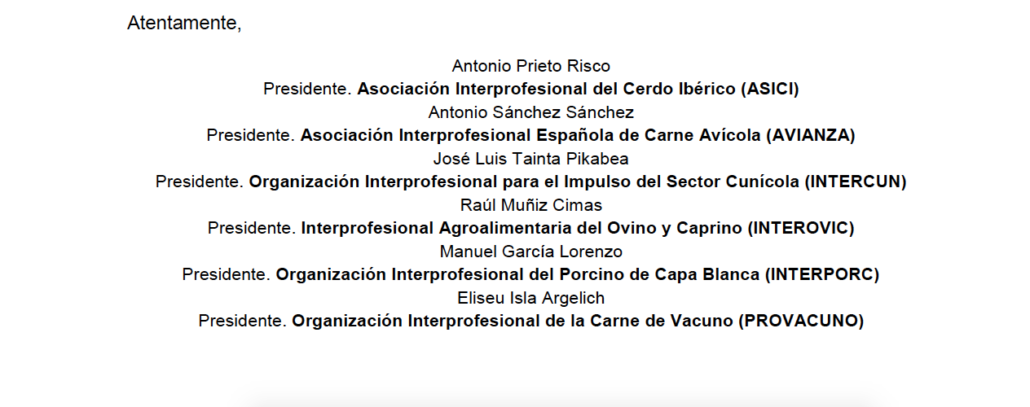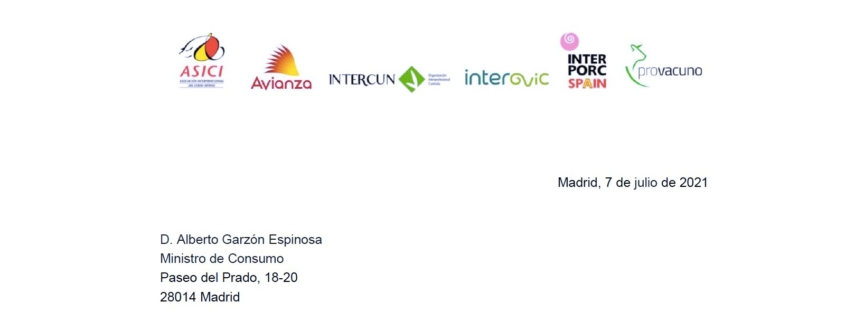Carta abierta sector ganadero-cárnico
Esta es la carta suscrita por las seis interprofesionales del sector ganadero-cárnico ante la campaña lanzada desde el Ministerio de Consumo y su titular, D. Alberto Garzón Espinosa. En ella recogemos nuestro «estupor» por lo que consideramos un ataque injustificado a una parte muy importante de nuestra población, nuestra economía y nuestros profesionales.
Desde Avianza, la asociación interprofesional española de carne avícola, no podemos estar más en desacuerdo con sus declaraciones. Somos un sector que ha contribuido de forma responsable y comprometida a la alimentación saludable de la sociedad, que no ha dejado de trabajar en los momentos más complicados de esta pandemia, cuando se nos pedía estar ahí para abastecer a la población. Que ha realizado importantes esfuerzos en materia de innovación, transformación digital, sostenibilidad y apoyo de ese estilo de vida mediterráneo que menciona, y del que somos parte. Excluirnos o atacar nuestro sector es borrar una parte importante de nuestra cultura gastronómica y de nuestra aportación de valor a la economía de nuestro país.
Carta suscrita por ASICI, Avianza, Intercun, Interovic, Interporc y Provacuno
Estimado Sr. Ministro:
Las seis Organizaciones Interprofesionales firmantes queremos manifestarle el estupor de los cientos de miles de ganaderos, empresas, trabajadores y técnicos de toda España vinculados a los sectores ganaderos y cárnicos a los que representamos, ante la campaña suscrita por usted mismo y el Ministerio del que es titular, en la cual difama al conjunto del sector ganadero-cárnico.
Es preocupante que un ministro del Gobierno de España enarbole una serie de afirmaciones, erróneas todas ellas, y hacerlo además a través de canales públicos, tratando de crear una confrontación artificial con un sector, el ganadero-cárnico, que cumple un rol social y económico de primera magnitud en nuestro país. Según la FAO, nuestro sector genera en España más de 2,5 millones de empleos y casi 9.000 millones de euros de exportaciones a la balanza comercial de España.
Es irresponsable usar los datos de forma torticera cuando, muchos de ellos, son del Gobierno del que forma parte, como los datos oficiales de consumo del Ministerio de Agricultura, Pesca y Alimentación o los datos del Inventario Nacional de Gases de Efecto Invernadero del Ministerio para la Transición Ecológica y el Reto Demográfico.
El sector que representamos continuará con su labor divulgativa a través de datos contrastados, como los siguientes:
- Cuando asegura que el consumo excesivo de carne ha conllevado el aumentos de enfermedades cardiovasculares, diabetes e, incluso, de algunos tipos de cáncer, debe saber que todos los indicadores internacionales reflejan que el patrón de dieta y de estilo de vida de nuestro país es de los más adecuados del mundo, ofreciendo perfiles que sitúan a España a la cabeza mundial:
- España es el país más saludable del mundo (según el ranking de Bloomberg, Healthiest Country Index).
- España es el país con mayor esperanza de vida del mundo (según el IHME de la Universidad de Washington y la prestigiosa revista científica The Lancet).
- España es el país con más esperanza de vida de la Unión Europea (según el informe “State of Health in the EU 2019” de la Comisión Europea).
- España tiene un índice muy por debajo de la media en incidencia de cáncer de todos los países de la OCDE (según el estudio “Health at Glance 2019” de la Organización para la Cooperación y el Desarrollo Económicos (OCDE).
- Cuando asegura que para producir 1 kg de carne se requieren 15.000 litros de agua, debe saber que el 90% del agua que se atribuye a la producción de carne es «agua verde», procedente de la lluvia, que seguiría cayendo en caso de desaparición de los animales. Solo un 10% corresponde a «agua azul» y «agua gris», una cantidad inferior a la de muchos cultivos vegetales.
- Cuando asegura que el 14,5% de los gases de efecto invernadero a nivel mundial provienen de la ganadería, debe saber que:
- La producción de ganado y estiércol representan solo el 5,8% de las emisiones (Climate Watch y World Resources Institute, Our Wolrd in Data. Oxford University. 2020).
- La energía, ya sea en forma de electricidad, calor, transporte o procesos industriales, representa la mayoría (el 74%) de las emisiones de gases de efecto invernadero (GEI). El sistema alimentario mundial, que abarca la producción y los procesos posteriores a la agricultura, como el procesamiento y la distribución, representa el 26% restante de las emisiones. Y de ese 26%, la ganadería y la pesca representan solo una tercera parte (Joseph Poore y Thomas Nemecek. Science, 2018).
- El 80% de las emisiones de gases de efecto invernadero (GEI) procedentes de la ganadería en el mundo provienen de los países en vías de desarrollo (FAO, 2017). No podemos contribuir a mitigar el cambio climático con una visión eurocéntrica.
- La intensidad de las emisiones (CO2 eq/kg de carne) varía entre las diferentes áreas del mundo. En nuestro entorno (Europa del Oeste) tenemos una de las intensidades de emisión más bajas del mundo (FAO, 2017). Nuestros sistemas productivos son más eficientes en el uso de los alimentos, en el manejo y en la sanidad animal. Por eso producimos menos emisiones por unidad de producto final.
- Es importante que recuerde que, en España, según los datos oficiales del Inventario Nacional de Gases de Efecto Invernadero -Ministerio para la Transición Ecológica y el Reto Demográfico-, la producción ganadera de carne representa únicamente el 7,8% del total de emisiones de GEI de nuestro país. Por el contrario, el transporte supone el 27% de esas emisiones, seguido por la industria con un 19,9%, la generación de electricidad (17,8%), el consumo de combustibles (8,5%) o los procesos industriales y uso de otros productos (8%) (MITECO, 2020).
- Es importante que recuerde también que el metano que se produce en la agricultura representa en torno al 27% del metano total emitido en el mundo. Este metano forma parte de un ciclo biogénico (se transforma en CO2 y H2O en 12 años), que pasa a ser absorbido por las plantas en las fotosíntesis. Con censos ganaderos estables, no aumentamos el CO2 en la atmósfera a lo largo del tiempo, por lo que no contribuimos al calentamiento como lo está haciendo el consumo de combustibles fósiles. Por tanto, nuestra reducción de emisiones contribuye a la mitigación del cambio climático, al igual que otros sectores económicos.
- Cuando asegura que “el abuso de antibióticos pone en peligro su eficacia tanto para los animales como para los humanos”, debe saber que:
- El uso de antibióticos como promotores de crecimiento de los animales de granja está prohibido desde 2006 (Directiva 2001/82/CE y sus posteriores modificaciones). Solo a veces, como ocurre en el caso de los humanos, es necesario tratar a los animales destinados a la producción de alimentos para curar alguna enfermedad bacteriana. El uso responsable de medicamentos garantiza el bienestar de los animales, y que los alimentos que de ellos se derivan sean sanos y seguros.
- La normativa europea regula qué medicamentos y cómo se pueden emplear para tratar a los animales. Así, solo se pueden usar los medicamentos que han sido autorizados tras haber sido sometidos a una evaluación de riesgo con base científica y resultado favorable.
- Así lo ha confirmado también la Agencia Española de Medicamentos y Productos Sanitarios (AEMPS) indicando que España redujo un 13,6% las ventas de antibióticos veterinarios en 2019, siendo una reducción del 58,8 % entre 2014 y 2019 (Plan Nacional de Resistencia a Antibióticos).
- A nivel europeo, según el último informe de la Agencia Europea de Seguridad Alimentaria (EFSA) sobre el seguimiento de residuos de medicamentos veterinarios y otras sustancias en animales y productos de origen animal, solo se detectaron un 0,30% de no conformidades en 2019. Así, la EFSA concluye que hay un elevado nivel de cumplimiento y que el sistema de vigilancia europeo es sólido y contribuye a proteger al consumidor.
Como sabe, hace escasos meses tuvimos ocasión de reunirnos con el Secretario General del Ministerio de Consumo, con el que mantuvimos una muy cordial y fructífera reunión. En el encuentro, presentamos todas las iniciativas sectoriales de apoyo a la recuperación del país tras la grave situación de pandemia. Unas iniciativas que incluyen fuertes compromisos en los ámbitos de la sostenibilidad y la transición hacia modelos de producción basados en la neutralidad climática y la circularidad, así como el empleo de calidad, la vertebración territorial, la igualdad de oportunidades y los patrones de consumo equilibrados y saludables para toda la población.
Lo dijimos en la reunión y lo reiteramos ahora: el sector ganadero-cárnico contribuye a la creación de empleo y crea oportunidades y tiene fuertes compromisos medioambientales con resultados comprobables. Desde el sector, seguiremos en la senda de la colaboración institucional y el diálogo; y seguiremos confiando en que nuestros responsables públicos contribuyan, con su actitud y sus manifestaciones, a ese clima de entendimiento y no al construir una confrontación que no existe.
Atentamente,


